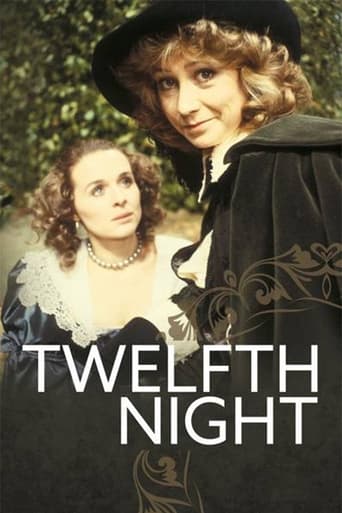

I have never really been that impressed with the BBC Shakespeare and it is not so much because of the low budget but because the characterisations generally have not been all that good. Take for instance the Nunn production in 1996, the way the characters acted, and the expressions on their faces, added so much more life to the production than did the actors in this rather tired rendition. It seems as if the whole purpose was that they were simply acting out a Shakespearian play, and simply tried to let the fact that it was Shakespearian carry the day rather than the actors carrying the play. In a way, for all of Shakespeare's brilliance, the play will not carry itself, and even the best play will fall flat on its face if the actors do not actually give life to the play.One of the things that stood out was that it was quite clear that Viola was a female, however I suspect that the reason that she was able to get away with having long hair was because the rest of the cast had long hair as well (with the exception of Olivia's drunken family members). What differentiated the sexes was not so much their hair but rather their dress, and by dressing as a male, Viola was able to pass herself off as a male, though it was quite clear that when she attempted to speak in a low voice she was putting it on. Fortunately her brother, Sebastian, also had long blonde hair, since one of the things that really does carry the play is when Olivia confuses Sebastian for Viola, but one again, the way Nunn did the play made it so much better.Another thing that I noticed about the play (and not so much the film) was not only how Shakespeare is the master of the double entendre, or how Shakespeare can be incredibly dirty when he wants to be (and sometimes I wonder if the more sophisticated audiences actually get some of his cruder jokes) but how the saying 'being well hung', generally referring to the size of one's member, has been around as long as Shakespeare. Then again, there has been a bit of research done on the history of crude jokes, and I even have a book called 'Dirty Shakespeare' which goes through all of Shakespeare's dirty jokes.As for a film, I probably would not recommend it. The Trevor Nunn version is actually available free on You Tube, so if you really have a hankering to watch Twelfth Night, then I would refer you to that play. This version can pretty much remain sitting on the dusty shelves of a forgotten corner of the video stores (though this one is on Youtube as well).
... View MoreTwelfth Night as of now is my favourite of Shakespeare's plays, and this is a truly delightful version, tying with Branagh's 1988 adaptation as my favourite of the four versions so far seen(the other being the Nunn film and the hard to find 1987 Australia version, both good). The costumes and sets are charming and very sumptuous as well as some dark tinges to add some dimension to the play(if not as much as Branagh's, which is the most successful at bringing this side out), with the photography suitably skillful. The writing is as witty and funny as ever, and the story still has its charm. Generally I thought the cast were great. Ronnie Stevens' Sir Andrew Aguecheek didn't have to go into falsetto as often as he did, but he was nonetheless amusing. Sinead Cusack is a moving Olivia and Clive Arrindal a dashing Orsino. Annette Crosbie is excellent as Maria and Robert Lindsay is a perfect Fabian as is Robert Hardy as the slovenly and often hilarious Sir Toby Belch. Trevor Peacock is decent as Feste(though I thought Branagh's Feste was more effective), Felicity Kendal is a charming and impish Viola and just about convinces as a boy and Alex McCowen is an obseque and indignant Malvolio. I also want to give this performance credit for making Antonio's desire for Sebastian believable and quite moving, something that could've fallen flat but didn't. Overall, if I had to choose which I just preferred out of this and Branagh's version, I say Branagh just edging it but this is a delightful version regardless. 9.5/10 Bethany Cox
... View MoreThis movie was absolutely delightful. It was a lovely introduction to Shakespeare, for ( if I remember correctly at a distance of 20-something years ) the 12-or-13 year old that I was back then. ( I stayed up way past midnight so that I could see the end of it - it was lucky that I was on holiday at the time! )The casting was excellent, especially the actors chosen to play Viola and Sebastian ( they looked like they were related! ), and Malvolio. The sets were well done, and the costuming ( again from the distance of too many years ) was good. The entire production was just charming.I would dearly like to see this movie again, if anyone knows where to get a copy of it. ( Video or DVD )
... View MoreI've seen quite a bit of Shakespeare in my lifetime, but not as finely done as this one.The definitive actress in this was Felicity Kendal... She played the twins parts elegantly and was incredible in her interpretation and presentation.When I saw this, I promised myself I'd remember the name... It stuck with me... 7 years after this showing, I married... 10 years after viewing, the second "Felicity Kendal" was created and named...If you haven't guessed, it's worth seeing. If anyone happens upon a tape of this or any other Felicity Kendal shows, feel free to contact me.
... View More